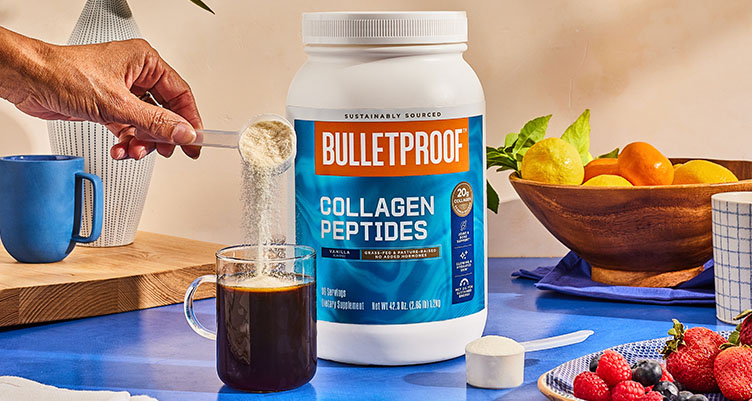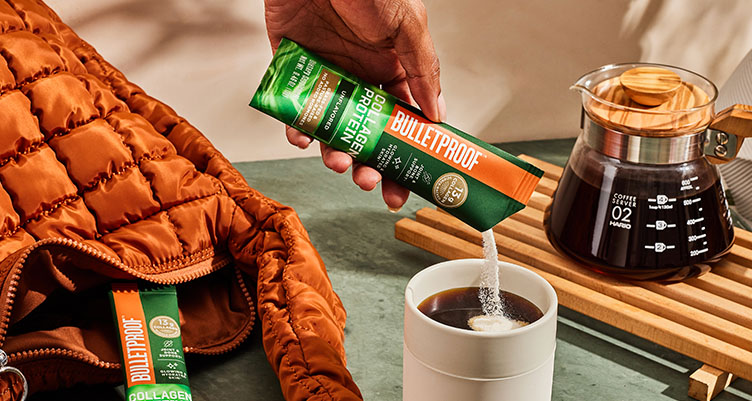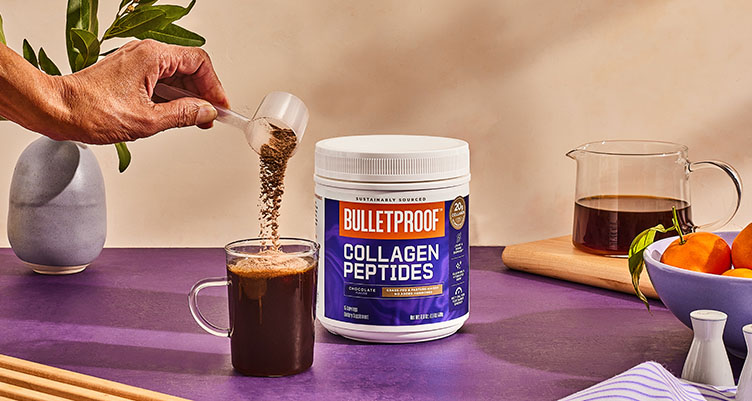Do Collagen Supplements Work? What the Science Says

- You’ve seen people adding collagen peptides powder to everything from coffee to baked goods. But how do collagen supplements work, exactly?
- Your body naturally produces collagen. It’s the most abundant protein in your body, supporting everything from strong bones to glowing skin. But collagen production slows down as you age…starting in your 20s.
- That’s where collagen supplements come in. Find out how they work and ways to use Bulletproof Collagen Peptides from morning to night.
Collagen is the glue that holds your body together. That’s not just an expression—this protein powerhouse forms the connective tissue in almost all of the structures in your body, like your skin, nails, bones and joints. But what about collagen peptides? How do collagen supplements work, and what do they even do? Good news: We have answers. Read on to learn how collagen supports whole-body benefits and the best ways to get it in your diet.
What does collagen do?

As the most abundant protein in your body, collagen is an important building block for whole-body health.
Collagen reduces wrinkles, increases skin hydration and supports strong joints, among other benefits.[1][2][3][4]
Your body naturally produces collagen every day. But over time, that production slows down—starting in your 20s. “There is an enzyme in our skin called collagenase, which breaks down collagen,” says Debra Jaliman, MD, author of “Skin Rules: Trade Secrets from a Top New York Dermatologist.”
“After the age of 25, we break down more collagen than we make, so that’s why we start to see fine lines and wrinkles,” she says.
According to Anne Kelly, MD, medical director at the Holland Biomedical Clinic and Minnesota Hyperbaric Treatment Center, “I think of collagen protein as another ingredient in the recipe that delays aging, but it’s not just a beauty product for the skin. It is the brick-and-mortar foundation for multiple functions in the body.”
Here’s a quick look at the benefits of collagen peptides.
Glowing & hydrated skin

“Collagen is the most abundant protein in the skin. It makes up 75-80% of your skin,” Jaliman says. “The middle layer of the skin is called the dermis, and that is where we find the collagen and elastic tissue. This is the layer that gives skin its fullness and plumpness.”
Also called collagen protein or collagen hydrolysate, collagen peptides support overall skin health and helps combat the effects of aging. It can reduce the appearance of wrinkles and increase skin hydration and firmness.[5][6]
“Collagen protein consumption can increase skin elasticity and can help your body’s skin repair process, thus encouraging your body to form new collagen,” Jaliman says.
Joint & bone support

In addition to supporting overall bone and joint health, collagen supplements can decrease joint pain after exercise, improve flexibility and provide amino acids the body needs to maintain the normal process of bone turnover.[7][8]
This is a big deal for collagen’s anti-aging benefits, but it’s also good news for people who work out and care about their ligaments: A 2008 study of 147 athletes at Penn State University found that their joint pain was reduced when they took collagen supplements.[9]
So, what do collagen supplements do? They support everything from healthy joints to youthful skin. Still wondering about the science behind how they work? Keep reading for details and expert insights about what to know before you buy.
How do collagen supplements work?

Your body is filled with cells that have specific jobs to keep your engines running. Fibroblasts are cells with an important job: They produce collagen.
In order to make the magic happen, fibroblasts need access to amino acid building blocks—namely, the amino acids glycine, proline and hydroxyproline.
Collagen supplementation gives your cells the amino acids they need to continue doing what they do best: make more collagen.
You’ll usually find collagen supplements in powder form, called hydrolyzed collagen peptides. “Hydrolyzed” means the collagen has been broken down into a smooth, light powder that is easier for your body to digest and use.[10]
Do collagen supplements survive digestion?
One critique of collagen powder is that your stomach acids break down the collagen peptides before they can start doing any good stuff. In reality, collagen supplements are digested into amino acids and peptides in your gut.
In order to be used by your body, those amino acids and peptides are absorbed by the small intestine then circulate into your bloodstream. According to nutrition expert Kelly Schmidt, RD, LDN, founder of the holistic practice Kelly Schmidt Wellness, collagen is a large molecule—but once it is hydrolyzed into collagen peptides, “we are capable of digesting the compound.”
The research backs this up. Research has shown that after hydrolyzed collagen peptides ingestion, collagen levels in the blood increase, Schmidt says.[11] [12]
The bottom line: Do collagen supplements work? As a dietary supplement, collagen peptides provide important building blocks for your body to make more collagen, and they’ve been shown to work—whether you’re looking for skincare or a recovery supplement with extra health benefits.
What to know before you buy collagen supplements

“Like any supplements, there are some brands and forms of collagen protein better than others. Look for labeling to indicate the collagen peptides do not have fillers and that it’s from a grass-fed product,” Schmidt says.
Read the labels of your collagen products to understand how much collagen you’re getting per serving, as well as the source. Bulletproof Collagen Peptides are type I and type III bovine collagen from grass-fed cows. There are at least 28 different types of collagen, but type I, type II and type III form 80-90% of the collagen in your body. Types I and III specifically support your skin, muscles and ligaments.[13]
If the product is flavored, find out whether you’re consuming more sugar than expected. Bulletproof’s flavored Collagen Peptides have 0 grams of sugar and are sweetened with natural sweeteners like stevia leaf and erythritol.
With so many collagen supplements on the market, it can be tough to decide which one to try first. Good news: It all boils down to preference and how you want to use it. All Bulletproof Collagen Peptides mix easily, so you can add a serving to whatever, whenever.
Here are some ideas:
- Unflavored Collagen Peptides for a versatile powder that you can add to anything from a Blueberry Vanilla Smoothie to Zoodles With Keto Alfredo Sauce. (And if you want to take your collagen on the go, try Collagen Peptides Packets!)
- Chocolate or Vanilla Collagen Peptides to turn your coffee into a mocha or add a touch of vanilla sweetness to your favorite recipes.
- Energy Collagen Protein (Vanilla Bean or Dark Chocolate, yum) for a collagen supplement with a complete amino acid profile, plus a Custom Energy Blend of ginseng, magnesium and cordyceps mushroom. Perfect for your morning smoothie!
- Collagelatin is collagen peptides plus gelatin, so it comes in handy for protein-packed pudding, jellies, sauces and even the marshmallows in these Keto S’mores.
- Sleep Collagen Protein is your ticket to dreamland.† It’s a soothing bedtime tonic with 3mg melatonin, plus a Custom Sleep blend of chamomile and magnesium.
Recipes with collagen peptides

Ready to start using collagen peptides? Save these Bulletproof Recipes for delicious inspiration!
Breakfast
- Fluffy Almond Flour and Vanilla Pancakes
- Savory Sweet Potato Waffles
- Keto Chocolate Noatmeal
- Collagen Breakfast Cookies
Sides
- Keto Low-Carb Bread
- Easy Homemade Collagen Bone Broth
- Creamy Mashed Sweet Potatoes
- Paleo Cauliflower Fritters
Drinks
- Keto Hot Chocolate
- Bulletproof Matcha Latte
- Keto Green Lemon Smoothie
- Low-Carb Swirled Blueberry Vanilla Smoothie
Desserts
- Paleo Pumpkin Muffins with Collagen Protein
- Keto Brookies (Brownie Cookies)
- Easy Keto White Truffles
- Currant Meyer Lemon Scones
Sign up for early access to sales, product launches, the latest Bulletproof news and more!
This article has been updated with new content.



